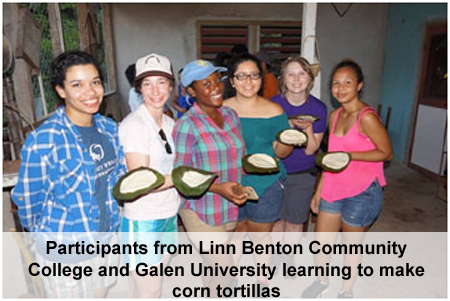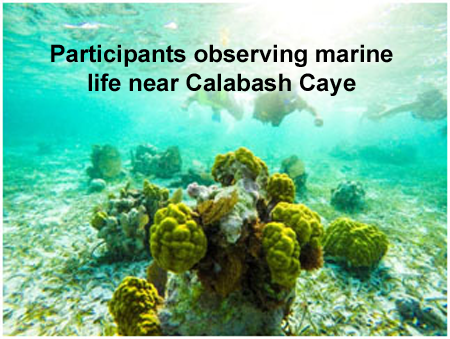May 30, 2017
Editor Sir,
A few weeks ago, from March 24 to April 1, a group of 17 persons, including six students from Galen University, four students and a professor from Linn-Benton Community College in Oregon and two instructors from Ecology Project International (EPI-Belize), embarked on a field-based ecology course to Calabash Caye and Cockscomb Basin Wildlife Sanctuary. We were going to learn about the ecosystems and importance of these natural resources while also learning to collect scientific data.
Upon our arrival at Calabash Caye, where we spent our first five days, we, the students, were given a quick tour of the University of Belize’s ERI research facility where we were accommodated. The first step was learning how to snorkel. The majority of us, including myself, had little to no experience with snorkeling. However, our instructors, Connally Canto and Katherine Brady, graciously taught us step-by-step how to snorkel confidently. After what seemed like three nervous panic attacks for me, I finally mastered the basics of snorkeling and became comfortable to participate in all activities.
The next few days were comprised of theoretical and practical work. Various topics that were covered included: coral reefs – their life cycle and importance to the ecosystem; coral bleaching; fish identification; invasive lion fish species and its effects on ecosystems; capture and dissection of a lion lish to examine its stomach contents; mangroves and their importance to ecosystem; transect analysis; and methodologies for conducting scientific research. All these topics were taught under the major theme of the impact of Climate Change on these ecosystems.

I was surprised to learn that currently there are no marine predators for the lion fish. As a result, their numbers can and will increase. Having no way to effectively stop their destruction, the future seems a little bleak. Currently, the lion fish is consuming the juveniles of numerous fish which have been sustaining the health of Belize’s reef ecosystem. One such fish being devoured by the lionfish is the parrot fish. The parrot fish is responsible for eating the algae from off the coral, which assists in preventing coral bleaching. Although we saw various types of parrot fish during our research, we learned that they were not in abundance as they used to be. This raised concerns. Corals are considered the fauna of the sea and if destroyed, they take a very long time to regrow; hence, the necessity for protection. A special characteristic about the coral reef that is perhaps not highly appreciated is its enormous environmental and economic benefits to Belize.
One of the special features of this course was that it also included dynamic team building games and activities. These games not only revived our energy levels, but it also assisted us in developing positive team spirit, critical thinking skills, confidence in group participation, and support for one another. These games provided skills that were not taught in a traditional classroom setting but were essential for building respect, trust, and friendship between the mixed group of Belizean and U.S. students. While we learned about nature, we also learned more about ourselves – personally and about one another. Admittedly, this method of learning should be adopted by all schools because I learnt so much more during those nine days, than I would have learned in an entire semester sitting in a class room.
The learning environment was both challenging and fun at the same time, such that at times it was difficult to decipher which part was work and which were for pleasure. Each time we dove into the water, something new and fascinating was awaiting us. On our second day, for example, we swam with dolphins and these animals gave us quite a show, jumping out of the water and racing near our boat. On our third day whilst identifying the various fish species, we saw a nurse shark basking in the rays of the sun, tucked soundly near some bolder corals. Not far from where the nurse shark was resting, a lion fish camouflaged itself into the corals, slowly stalking its prey; little did the lion fish know that it would become the main subject for our dissection session. The several bags of plastic trash that we picked up from the beach and analysed made us realize the huge pollution problem that needs to be addressed.

The remaining four days exploring the rainforest at Cockscomb Basin Wildlife Sanctuary were also quite a treat, to make us appreciate in a deeper way the beauty of our country in a way that I had never been exposed to before. Besides enjoying the forest and gorgeous waterfalls at Cockscomb we also learned about the culture of the Mayas there, including learning to grind cacao for chocolate, and making corn tortillas with Ernesto Saqui’s family at Maya Center. Such an experience made me realize the deep appreciation that comes when various cultures interact positively with each other.
The nine days I spent on the Ecology Project International Belize course have been an eye opener as it not only revealed my level of ignorance of Belize’s resources, but it also increased my awareness of the impact of our actions on the environment. As individuals who have been enlightened by this experience, we need to raise the awareness about the importance of environmental education.
Currently, the health of Belize’s environment is challenged by various factors and changing for the worse. However, we as citizens still have the power to influence the outcome. Our actions for change do not need to be extreme. It can be something simple as proper disposal of the garbage or turning off electrical devices in the house when not in use, and reducing the use of plastics.
For us six students from Galen University who participated in the EPI-Belize course we realize at a deeper level that we all have our part to play. We will commit to being that change that we seek. We wish that more Belizean youths could also enjoy this powerful EPI course. Those high-impact nine days in the sea and forest, gave us a deep awareness about Belize’s natural resources in a way that we have never experienced before.
We would like to thank the staff of EPI Belize, including the Manager, Mr. Jerry A. Enriquez; the Program Coordinator, Mr. Corey Constantino; as well as the dynamic field instructors, Ms. Connally Canto and Ms. Katherine Brady, for providing us with this great learning opportunity.
Sincerely,
Julia Arzu

